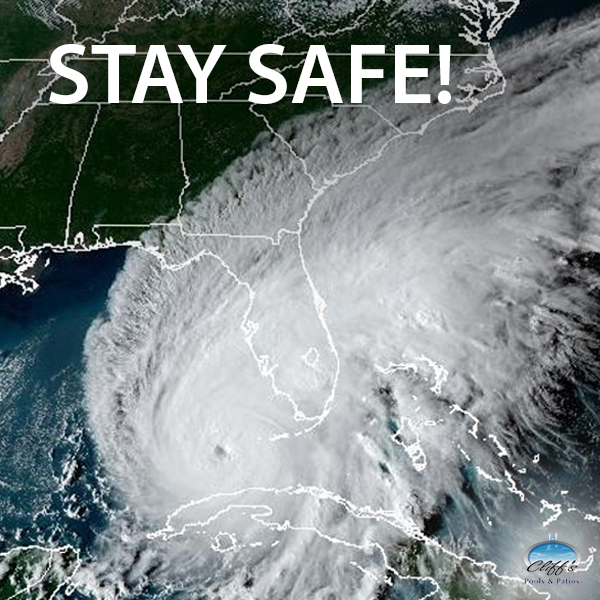Cliff’s Pools and Patios will be exceptionally busy before and after a storm, but our priority will be to our valued service and maintenance customers who will receive special services first. For those of you who would need help preparing the pool, patio or equipment area for the storm, our team of technicians and managers will all be available to assist with pre-hurricarie preparedness to:
- Drain off some water to the bottom of the waterline tile
- Super-chlorinate your water to allow for all the windborne debris that will get into your pool
- Assist with (reasonable) patio furniture stowage
- Assist with electrical disconnects by covering with tightly wrapped plastic
The cost for pre-hurricane preparedness service is $250 and up.
Cliff’s Pools and Patios will also be there for you AFTER the Hurricane for the clean-up. As you can imagine, post-hurricane clean-ups are not part of routine service and maintenance. We are here to help put your beautiful pool back together again. A manager will quote you the cost of those post-hurricane clean-up services based on the extent of your damage or clean-up requirements.
Here are a few guidelines from Cliff.
Swimming Pool Hurricane Preparation
Should I drain my pool?
The absolute number one rule: DO NOT EMPTY YOUR POOL
Keeping sufficient water in your pool provides the weight required to hold the bottom in place to prevent “pool popping”. This is even more critical during the storm, as storm water adds to the normal ground water table creating even more hydrostatic lift potential.
Should I lower the water level in my pool?
If your pool is equipped with adequate drains and skimmers, and the surrounding areas accept drainage, the water level can probably be left as is. In cases where the additional overflow water might damage surrounding structures or create flooding indoors before it can run off naturally, then Cliff’s Pools and Patios recommends lowering the water level to the waterline tile only. Never expose or allow your Diamond Brite to dry out and crack.
Should I do anything to the pool water chemistry?
Yes, it is recommended that you “super chlorinate” the pool water. You should “shock” your pool water in the normal manner. This is typically twice the amount of chlorine you would normally apply.
Should I leave my pool pump and other electrical systems turned on?
It is important that all electrical power be turned off at the circuit breakers before the storm. Any exposed electrical equipment such as electric motors for pumps, electric air blowers, or electrically operated pool/spa heaters should be tightly covered with plastic wrap.
Should I throw my patio furniture into the pool?
No, but the key word here is “throw”. Never throw or drop anything into the pool that could damage the finish on the walls or bottom. It is best to remove any and all loose objects such as chairs, tables, pool equipment and even toys, which can become dangerous projectiles in high winds. If you cannot store them inside a building, carefully and gently placing them in the pool will help shield them from the winds. Be very careful in doing so, and remember, pool chemicals could damage them. This is not recommended.
Should I take any special precautions with my decking and screening?
Some damage to the frame of your enclosed screen enclosure may be avoided if you provide a “vent” for wind to escape through. Panels in screens may be removed on either side of the pool area. Doors, which are especially vulnerable, might be removed completely.
Should commercial pool facilities take any additional special precautions?
Stored chemicals should be removed to a safe, high and dry location. Remember some chemicals, when mixed, can produce dangerous gases, and others, if wetted can cause fires. Sump pits should be cleaned and sump pumps should be checked. A portable gasoline operated pump is helpful if power is not restored quickly. Pools near apartment units/motel rooms should have water levels lowered by 1 to 2 feet if potential flooding is a factor. Remove all loose items around the pool area including trash cans, ashtrays, potted plants, nets, etc. Equipment covers should be secured by being lashed or bolted down.
Swimming Pool Hurricane Recovery
How should I remove the debris from my pool?
Use a “pool rake” or other nets/skimming devices such as hose-powered leaf baggers to remove small debris. Do not use your regular pool vacuum equipment and pool pump, as they are likely to clog the underground plumbing.
What about the electrical equipment?
Be sure everything is dry before dealing with electrical start-up. Check your circuit breakers to be sure they are off before attempting to reconnect electrical equipment such as pump motors. Inspect the wiring (especially ground wires) for proper connections. Be sure that you are following manufacturer’s instructions when reactivating equipment.




